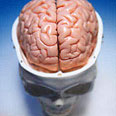
The human brain (illustration)
Israeli and American researchers have found a way to erase long-term memory in rats without damaging their brains in a study that could lead to targeted drugs for people suffering from dementia.
The findings show long-term memories are not as secure as thought and challenge the idea they stabilize after maturing from short-term memories, said Yadin Dudai, who led the study.
"Memory can be erased by applying a drug into a specific part of the brain that stores that memory," he said in a telephone interview. "Long-term memory can be erased."
In the study, published on Thursday in the journal Science, the researchers fed the rats saccharine, which made them sick and taught them to associate the taste with feeling unwell.
They then injected an enzyme inhibitor called ZIP into the rats' brains that blocked a protein, PKMzeta, which controls the flow of information involving memory between brain cells.
After the injection, the rats did not remember the association with saccharine, no matter how long the researchers had trained them to do so, said Dudai, a researcher at the Weizmann Institute of Science in Israel.
This suggests a key mechanism in the brain works like a piece of machinery to store long-term memory, Dudai said. Once the machinery stops, memory shuts down.
"This research is important because it casts light on the mechanisms of memory," Dudai said. "It also shows that long-term memory is not a permanent change and can be edited."
While the procedure is experimental and far too invasive to be done on humans, the results give drug makers a roadmap to develop new treatments related to memory, he said.
Once researchers know the mechanism in the brain that plays an important role in storing long-term memory, they can use that information in future studies to look at boosting memory, rather than erasing it, Dudai said.
This could result in potential uses to treat Alzheimer's patients in the early stages of dementia or people wishing to enhance their memory, Dudai said.
"The minute you identify a molecular mechanism that is critical for keeping memory going, you identify a potential target for drugs," he said. "The prime target is people with defective memories."















